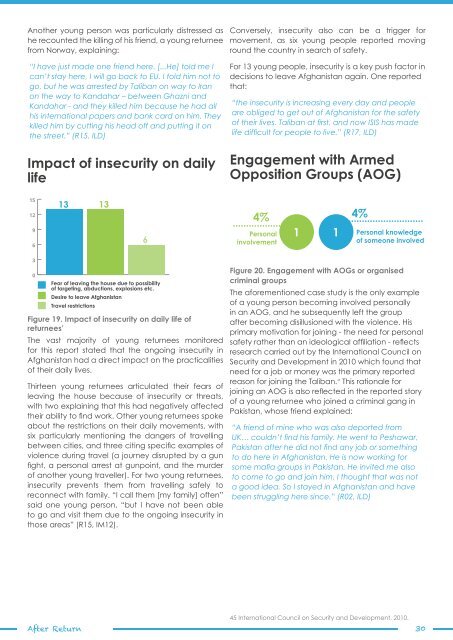After Return
After%20Return_RSN_April%202016
After%20Return_RSN_April%202016
You also want an ePaper? Increase the reach of your titles
YUMPU automatically turns print PDFs into web optimized ePapers that Google loves.
Another young person was particularly distressed as<br />
he recounted the killing of his friend, a young returnee<br />
from Norway, explaining:<br />
“I have just made one friend here. [...He] told me I<br />
can’t stay here, I will go back to EU. I told him not to<br />
go, but he was arrested by Taliban on way to Iran<br />
on the way to Kandahar – between Ghazni and<br />
Kandahar - and they killed him because he had all<br />
his international papers and bank card on him. They<br />
killed him by cutting his head off and putting it on<br />
the street.” (R15, ILD)<br />
Impact of insecurity on daily<br />
life<br />
Conversely, insecurity also can be a trigger for<br />
movement, as six young people reported moving<br />
round the country in search of safety.<br />
For 13 young people, insecurity is a key push factor in<br />
decisions to leave Afghanistan again. One reported<br />
that:<br />
“the insecurity is increasing every day and people<br />
are obliged to get out of Afghanistan for the safety<br />
of their lives. Taliban at first, and now ISIS has made<br />
life difficult for people to live.” (R17, ILD)<br />
Engagement with Armed<br />
Opposition Groups (AOG)<br />
15<br />
12<br />
9<br />
6<br />
13 13<br />
6<br />
4%<br />
Personal<br />
involvement<br />
1 1<br />
4%<br />
Personal knowledge<br />
of someone involved<br />
3<br />
0<br />
Fear of leaving the house due to possibility<br />
of targeting, abductions, explosions etc.<br />
Desire to leave Afghanistan<br />
Travel restrictions<br />
Figure 19. Impact of insecurity on daily life of<br />
returnees’<br />
The vast majority of young returnees monitored<br />
for this report stated that the ongoing insecurity in<br />
Afghanistan had a direct impact on the practicalities<br />
of their daily lives.<br />
Thirteen young returnees articulated their fears of<br />
leaving the house because of insecurity or threats,<br />
with two explaining that this had negatively affected<br />
their ability to find work. Other young returnees spoke<br />
about the restrictions on their daily movements, with<br />
six particularly mentioning the dangers of travelling<br />
between cities, and three citing specific examples of<br />
violence during travel (a journey disrupted by a gun<br />
fight, a personal arrest at gunpoint, and the murder<br />
of another young traveller). For two young returnees,<br />
insecurity prevents them from travelling safely to<br />
reconnect with family. “I call them [my family] often”<br />
said one young person, “but I have not been able<br />
to go and visit them due to the ongoing insecurity in<br />
those areas” (R15, IM12).<br />
Figure 20. Engagement with AOGs or organised<br />
criminal groups<br />
The aforementioned case study is the only example<br />
of a young person becoming involved personally<br />
in an AOG, and he subsequently left the group<br />
after becoming disillusioned with the violence. His<br />
primary motivation for joining - the need for personal<br />
safety rather than an ideological affiliation - reflects<br />
research carried out by the International Council on<br />
Security and Development in 2010 which found that<br />
need for a job or money was the primary reported<br />
reason for joining the Taliban. 45 This rationale for<br />
joining an AOG is also reflected in the reported story<br />
of a young returnee who joined a criminal gang in<br />
Pakistan, whose friend explained:<br />
“A friend of mine who was also deported from<br />
UK… couldn’t find his family. He went to Peshawar,<br />
Pakistan after he did not find any job or something<br />
to do here in Afghanistan. He is now working for<br />
some mafia groups in Pakistan. He invited me also<br />
to come to go and join him. I thought that was not<br />
a good idea. So I stayed in Afghanistan and have<br />
been struggling here since.” (R02, ILD)<br />
45 International Council on Security and Development. 2010.<br />
<strong>After</strong> <strong>Return</strong> 30


